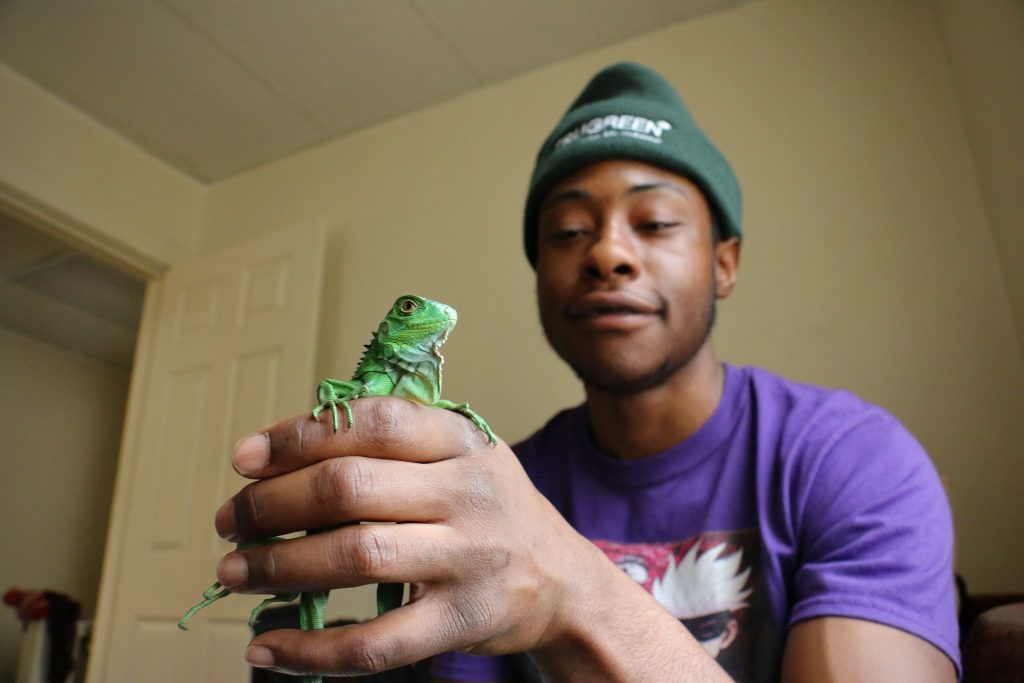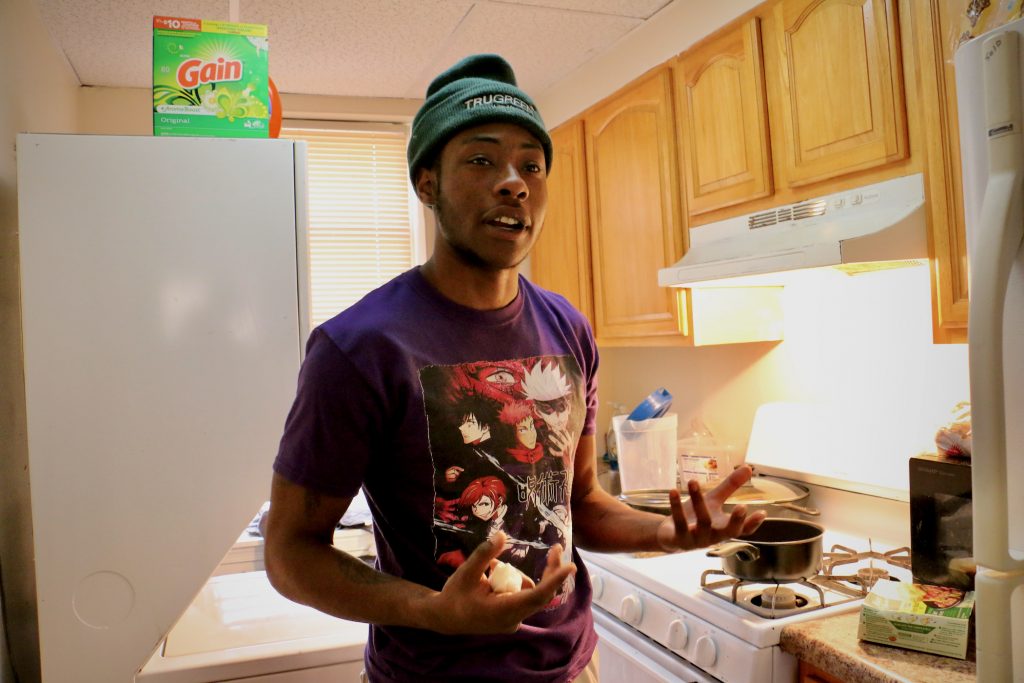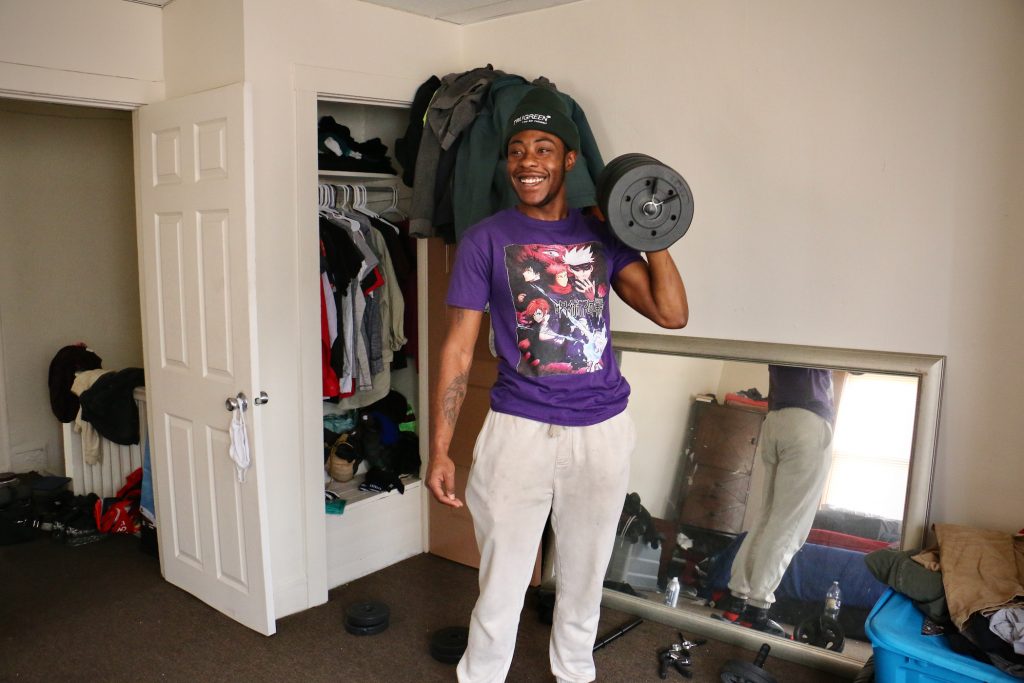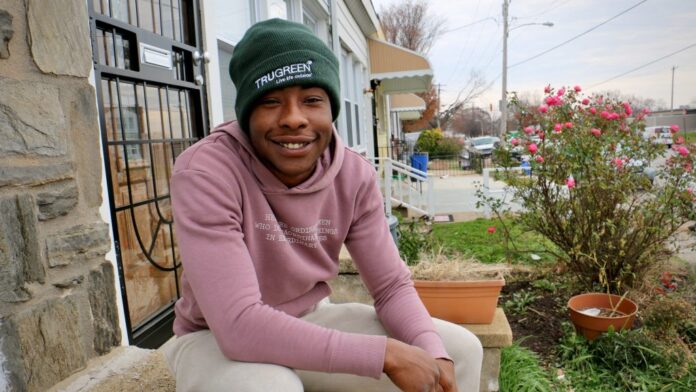This story first appeared in Billy Penn.
Asyod Boyd’s personality spilled out all over his second-floor Southwest Philly apartment. There’s a set of weights in the bedroom, since he’s trying to “bulk up,” and the pantry is filled with Uncrustables, his favorite snack.
He’s even got a pet. One of few his lease would allow, it’s a tiny iguana named Sir TD who munches on cucumber slices in the living room. Boyd loves the place — the first he’s been able to call home after living in his car for almost two years.
It’s all thanks to a new, one-of-a-kind rapid rehousing program called Way Home that’s designed specifically for LGBTQ people.
To launch the program in March 2020, nonprofit partners SELF, Inc. and the William Way LGBT Center received a $400,000 grant through Philly’s Office of Homeless Services, funded by the CARES Act. For one year, the program pays a portion of rent for 40 Philadelphians who’ve been experiencing homelessness.
Boyd’s been doing well since he moved into his one-bedroom in April. He puts up $500 of the rent each month, and Way Home covers the remaining $300.
“When it came to finding my own apartment, it was just saving up the bread for the first, last and security and all that,” said Boyd, who’s trans. “So for them to actually be able to do that for me, that was a blessing.”
By providing short-term rental assistance for a private apartment, rapid rehousing is considered a standard, effective, low-cost solution to homelessness. Larry Cohen, executive director of the housing nonprofit Point Source Youth, said it’s used nationwide by the Department of Housing and Urban Development, as well as by other cities, states, and nonprofits.
Way Home is one of the first in the country specifically for LGBTQ adults, according to Office of Homeless Services (OHS) spokesperson Sarah Peterson. She cited an 85% success rate for rapid rehousing in general, and said Philadelphia “hopes to continue and expand this program and others like it.”
If this program delivers on its promise, it would be a pretty big deal. Almost 6,000 people are experiencing homelessness in Philly, with nearly 1,000 of them completely unsheltered.
LGBTQ people are even more likely to be homeless, and stable housing can have a ripple effect: reducing the likelihood that they need to rely on sex work, that they’ll be a victim of violence, or that they’ll suffer an early death — a threat that continues to grow each year, especially for Black trans women.
“I get calls or emails every week from people saying they need housing,” said Cara Tratner, housing assistance manager at SELF. “Unfortunately, it has shown me that the issue of homelessness in the city is even bigger than what was already documented, because a lot of folks in this community aren’t currently in shelter.”

A long wait list and nervous landlords
The program isn’t perfect. Right now, Way Home’s waitlist is more than three times capacity. There are no wraparound services, and there’s a hard limit of one year of rental assistance. These are weaknesses experts say cut down on a program’s effectiveness.
One major hurdle: For so-called “rapid” rehousing, it can take a while. Boyd slept in his car every night for six months from when he applied to when he moved in.
It was an expensive way to live. Boyd’s car ran out of gas regularly when he’d fall asleep with the heat on. He incurred thousands of dollars in parking violations. The worst part was when he learned a close friend had died, and he had to grieve that loss from his front seat.
“I was having breakdowns,” said Boyd, who’s now 21. “It’s so different than having moments where you can be emotional in the privacy of your own home, than being emotional where anybody can walk past and see you.”
He’s one of the lucky ones. Others who applied at the same time didn’t get housing until months later. Hundreds more are still on the waitlist. Studies show that each day someone has to wait, they’re 2% less likely to maintain stable housing, said research fellow Matthew Morton, who studies youth homeleness at the University of Chicago’s Chapin Hall.
“So one of the challenges is to expedite the timeline for people to actually getting placed in rapid rehousing,” Morton said.
Rantik Parikh, one of the program’s landlords, said that out of the few dozen apartments he oversees, around six are currently filled by Way Home tenants. Overall, he’s a fan, though he was nervous to get involved at first, knowing the program would end after a year and the participants might not be ready to pay their full rent.
Those worries show up often, said Tratner, SELF’s housing assistance manager.
“The idea of having guaranteed rent payments for the entire year of the lease — I was expecting landlords to be thrilled,” Tratner said. “But the reality is there’s both a lot of stigma that landlords have against the homeless community, and they assume people are going to be bad tenants.”
She finds herself working overtime to find friendly landlords, and spending hours on the phone convincing them queer and trans tenants are just like everybody else.
Parikh appreciates the effort. Though he’s had some trouble with tenants getting into loud fights and creating huge messes, he said Tratner has been there every step of the way, even at one point hiring a professional cleaning service to help.
And as a first-generation immigrant from India, Parikh still remembers when he needed a little help to get settled in the United States. Participating in this program makes him feel like he’s paying it forward.
“I realized they’re wonderful people, and they just need a break,” said Parikh, 60. “Everybody needs a little support in bad times. And I could also see a change that this program brought in them. They become more stable.”

It takes ’10 octopus arms’ to serve the community
Rapid rehousing can be particularly good for queer and trans people because unlike a shelter, it allows them to choose where they want to live, and they can live alone. That reduces their risk of experiencing discrimination.
Boyd was at a doctor’s appointment seeking affordable transition care at Philadelphia FIGHT when staffers first told him about Way Home. He met all the eligibility requirements: He was over 18 years old, he was at or below 30% of area median income, and he was “literally homeless” — meaning he wasn’t sleeping somewhere that qualified as a home.
He also gives SELF manager Tratner a lot of credit. For the first few months of his lease, she called him once a week to check on him. When Boyd’s seasonal landscaping job ended for the winter, she reached out and offered that the program pay the full December rent, until he started his new winter gig (a warehouse job at Amazon).
“She is one of the most caring and considerate people for you,” Boyd said. ” I appreciated that, knowing that someone is actually there and will check up with me.”
Tratner is the program’s only full-time employee, which isn’t ideal, said Cohen, of Point Source Youth. He suggested at least four full-time employees, including multiple case workers and a real estate broker.
“That kind of staffing model becomes really critical, and we don’t want a lot of youth served with not the ideal amount of staff,” Cohen said. “Because then you’re not going to be able to really execute the program’s goals.”
That’s something SELF acknowledges. One of Tratner’s colleagues said her job required her to have “10 octopus arms” to support the community. In the coming year, they’ve already budgeted to hire one more staffer to work with Tratner.
Perhaps the biggest risk with a program like this one is that after a year, it ends.

What happens after a year?
Sometimes, a year of rental assistance is enough for people who’ve experienced homelessness to get back on their feet. Boyd thinks it’ll work for him.
He’s got stable income via a landscaping job that he loves, and has been able to save some money. He likes his landlord, his neighborhood and his apartment. He’s planning to stay there when his assistance runs out in the spring.
“Once April hits, I know that’s when I take over the step of paying the full $800 myself,” Boyd said. “And like, utilities-wise, bills-wise, I have enough. So I’m not really stressing it.”
One year is a pretty good benchmark for a program like this, said Cohen. But it doesn’t always work for everyone. That’s why he recommends a flexible end date — allowing extensions for the tenants who might need it.
Parikh, the landlord, is waiting with trepidation to see whether his tenants will have come far enough to afford their apartments. He’s worried.
“I’ll be honest with you, I am concerned,” Parikh said. “I don’t see that much progress that they will be able to pay the full rent. And to be honest with you, I don’t want to put anybody out.”
SELF’s Tratner readily agrees with Parikh’s concerns. She said she’s not sure how the program’s first year will close, either. Way Home’s funding was already renewed for a second year, extending assistance for a second round of tenants into summer 2022. To supplement the program, OHS added a new question to its housing assessment to ask whether people are interested in LGBTQ-affirming housing assistance.
Whether it will be extended again for a third year depends on how the city’s next budget shakes out in the spring. OHS spokesperson Peterson isn’t optimistic.
“These funds sunset in 2022 with no state or federal plans to renew or replace them,” she said. “With the loss of the federal CARES money, OHS faces a funding cliff that threatens many existing programs.”
But Tratner has made a personal vow to help bridge participants to another housing assistance program if that’s what they need.
“I feel committed to seeing people through that transition, not just saying, ‘Alright, it’s done, you’re on your own,’” Tratner said. “Because we also don’t want people to face possible eviction or anything else.”

